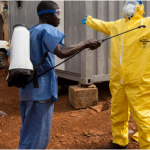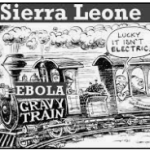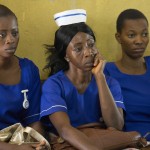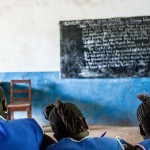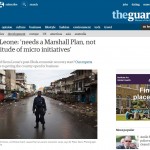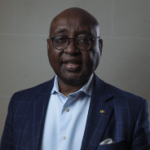In the fourth of a series of blogs about the impact and consequences of Ebola in Sierra Leone, ARI researcher Jamie Hitchen, recently back from a year spent working in the country, evaluates the Sierra Leonean government’s response to the Ebola outbreak. Jamie’s previous entries on Ebola in Sierra Leone focused on health care, economic hardship and stigma.
In light of the inadequate response to the Ebola epidemic, Sierra Leoneans have begun to ask questions about the political leadership of the president, Dr Ernest Bai Koroma, re-elected in 2012 with 58.7% of the popular vote, and his governing All People’s Congress (APC). In addition, the role played by the Ministry of Health and Sanitation (MOHS) has faced particular criticism.
President Koroma and Miatta Kargbo
An initial lack of urgency broadly characterised both national and international responses to Ebola, with the action of Medécins Sans Frontières a notable exception. Had President Koroma acted more decisively and demanded, in particular, greater regional and international support to tackle the virus at the outset he would not have always been playing catch up.
Guinea confirmed its first case of Ebola on 23 March 2014. Sierra Leone had its first tested and confirmed case of Ebola on 24 May 2014. Despite having two months to put precautionary measures in place, to develop a plan for responding to the virus crossing the border and to raise awareness amongst border communities to the danger it could pose, nothing significant had been done. In Nigeria, the levels of preparedness were critical to enabling the country to contain its outbreak.
A small but illustrative example of how President Koroma has always seemed to be a step behind occurred in July. Stranded in Kenema by helicopter fuel shortages he was unable to fulfil a commitment to visit Dr Sheik Umar Khan, the virologist leading the fight against the disease. Dr Khan succumbed to the virus himself on 29 July.
President Koroma has also faced criticism for supporting Miatta Kargbo, Minister for Health and Sanitation, even though it quickly became apparent that she was not capable of providing the leadership required.
Capacity and communication
Under Kargbo’s tenure little was achieved. No obvious lessons were learned from responding to previous health care emergencies including the cholera outbreak of August 2012. The closure of peripheral health care units, in rural areas, as the epidemic spread exacerbated and detrimentally affected the treatment of preventable diseases and conditions. To date, MOHS is struggling to ensure that basic health care services are made available to those in need of treatment for malaria and TB or in childbirth. Deaths from these still far outweigh those from Ebola.
Kargbo’s position became increasingly untenable from June 2014, after she accused victims of the virus of causing their own deaths and blamed health workers for spreading Ebola through promiscuous acts. However it was not until 29 August 2014 that she was fired with the president citing the need “to create a conducive environment for efficient and effective handling of the Ebola outbreak”. As the minister was retained in the Policy Strategy Unit, accusations of nepotism were levelled.
Undoubtedly the political response has been typified by a gap between rhetoric and delivery. Inadequate financial and human resources in government are familiar stumbling blocks to development in Sierra Leone. The MOHS was quite simply overwhelmed by Ebola and rendered heavily dependent on external assistance that has not arrived quickly enough.
Communications, a vital component of prevention, have been woefully inadequate. The messaging has not been timely, consistent or clear. Ultimate responsibility rests with the government, although a myriad of development and humanitarian organisations have also struggled to get the right messages to the people in a way that is easily understood. Lessons must be learnt.
Signs of improvement?
There are signs that the leadership is finally getting to grips with the situation. President Koroma’s decision to hand over the day-to-day running of the National Ebola Response Centre (NERC) to Major (Rtd) Alfred Paolo Conteh, Minister of Defence, has been seen as significant. Decisiveness characterised the imposition of a three-day, nationwide lockdown in September and confirmation of the extension of emergency measures for a further nine months.
Furthermore, President Koroma’s increased presence at isolation units and treatment centres, attendance at events celebrating survivors, support of the development of a remote education curriculum (as schools remain closed), and his welcoming of cross-party support, from Sierra Leone People’s Party (SLPP) leader, Brigadier (Rtd) Julius Maada Bio, in an effort to create a sense of national unity are important.
However, the tenuous cross-party consensus between the APC and SLPP is on the verge of collapse. President Koroma has yet to offer a definitive strategy to support economic growth or improve food security; government officials still do not have the human capacity to enforce quarantine measures effectively; health care workers are still dying far too frequently; internal communications are rudimentary at best; and Freetown is continuing to report over 60 new Ebola cases a day.
Long term consequences
For all the criticism that has been levelled against President Koroma for his poor handling of the Ebola outbreak there is a general acceptance, from Sierra Leoneans I know, that the response would have faced many of the same challenges regardless of the political party which had been in charge. But there is also mounting frustration – frustration that is directed towards all politicians, appearing as they do to be unable to communicate openly with the public and to deliver at all on their rhetoric of improving the lot of the poorest.
How this anger will manifest itself in the longer term is not yet clear. As it stands, the immediate need to fight Ebola trumps everything. When the virus is finally contained, more and more dissenting voices may emerge. What form dissent will take is not yet clear but should President Koroma make further efforts to legalise a third-term he is likely to find a disgruntled and youthful population vehemently opposing him
by Jamie Hitchen, Policy Researcher, Africa Research Institute







